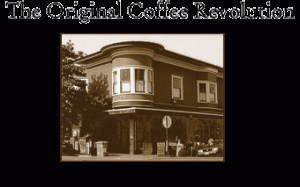Today's announcement didn't come as a surprise to Marcia Mogelonsky, Director of Insight at Mintel Food and Drink, an industry research firm based in Chicago. She told KQED's Joshua Johnson it's a red flag that “Peet’s was being threatened from someone and we can probably guess who that was.”
“What happened with Peet’s in the first quarter that might make it look like it needed protecting from--let’s be honest--Starbucks?” asked Johnson.
“Oh, you’re gonna say the S-word," said Mogelonsky. "I think the main problem that Peet’s has is the main problem that everyone is having: commodity prices are expensive; coffee’s gotten expensive. But Peet’s, unlike Starbucks, doesn’t have the national reach. It’s not a stand-out brand nationally."
Mogelonsky said Benckiser would be smart to push Peet's eastward.
“The East Coast is Starbucks saturated," she said. "It really needs a new coffee player on the East Coast because people are tired of Starbucks--they’re really looking for something different."
Mogelonsky said Benckiser is also well-positioned to expand Peet's to Europe because it just bought D.E. Master Blenders, a well-regarded tea and coffee company in the Netherlands.
But as the LA Times reports, Benckiser is known more for its holdings in luxury and beauty companies than coffee.
Benckiser owns a majority stake in Coty Inc., the maker of OPI nail polish and celebrity perfumes. Coty recently abandoned its attempts to buy beauty company Avon Products Inc. for $10.7 billion and said it instead plans to raise $700 million in an initial public offering.
Benckiser also owns Labelux, a luxury goods company with brands such as Jimmy Choo and Bally. The deal with Peet’s, which was unanimously approved by the coffee-maker’s board, is expected to close in about three months.
In a press release, the company said despite the sale, many things will stay the same.
At the close of the transaction, Peet's will be privately owned and will continue to be operated by the company's current management team and employees. Peet's Coffee & Tea, founded in Berkeley, CA in 1966 by Alfred Peet, will remain based in the San Francisco Bay Area, with its home office in Emeryville and its LEED® (Leadership in Energy and Environmental Design) Gold Certified roast-to-order facility in Alameda.
Alfred Peet opened the original Peet's on Walnut and Vine in North Berkeley. The chain has since expanded to six states including Colorado, Illinois, Massachusetts, Oregon and Washington.
Update 2 p.m. New Owner's Rodent Poison Lead to Complaints
"I've bought my last beans from Peet's," writes Kendra Armer on the KQED Facebook page. She and a few others are unhappy with Joh. A. Benckiser over a legal battle involving rodent poison.
According to the Wall Street Journal, Joh. A. Benckiser owns a stake in Reckitt Benckiser, among other companies. Reckitt Benckiser produces d-CON and several other rodent poisons that the EPA has argued violate measures designed to reduce health risks.
In 2010 Reckitt Benckiser sued the EPA to stop the enforcement of the measures and won, arguing that it had not been given a hearing before action was taken to enforce the measures.
MSNBC quoted a pesticide lobbyist talking about the number of children exposed to rat poison in its coverage of the lawsuit:
“You’re looking at very low numbers of exposures that (usually only) require observation,” said Karen Reardon, spokeswoman for a pesticide lobbying organization call Responsible Industry for a Sound Environment. “The benefits of the products are quite enormous, especially if you’re living in an environment where most people have exposure to rats.”
Some Bay Area residents seem to disagree.
"I'm disappointed to lose (Peet's) Coffee from my life, but I cannot put a penny more into a corporation with that kind of audacious and criminal disregard for the wildlife of my state and country," wrote Allen Fish on the KQED Facebook page. "Bye (Peet's) - you're hanging out with the wrong kind of people."
